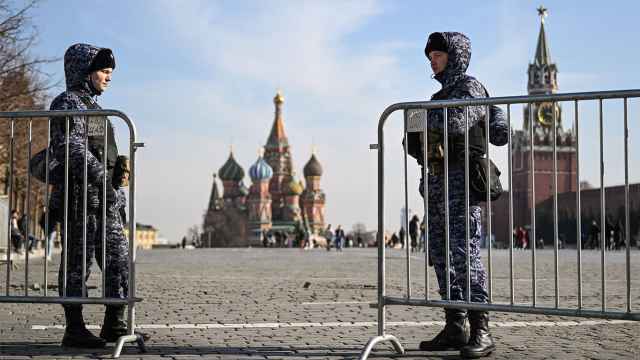The first MBA programs in Russia appeared more than 20 years ago. But to this day, employers have assigned little value to diplomas from Russian business schools and have given preference to job candidates with practical skills.
Yet graduates have a shot at making full use of their MBAs if they establish a clear-cut career plan early on and set concrete goals for themselves, job experts told Vedomosti.
Alexander Bogza is a case in point. Bogza, now deputy chief executive officer of Eurocement Group’s Yevrobeton, enrolled in a master’s of business administration course in 2005. He made the decision for practical reasons: At that time he was working in export operations for beverage and dairy giant Wimm-Bill-Dann and needed more unconventional approaches for his work.
One of his colleagues recommended getting an MBA degree at the Graduate School of Business at the State University of Management in Moscow.
Bogza didn’t regret his decision. “I struck up new business acquaintances,” he said. Plus, he “climbed the career ladder,” he said.
In 2007, immediately after he finished the Graduate School of Business, he was approached with an ambitious project: A Kuznetsk shoe factory in the Penza region needed to be pulled out of bankruptcy. Bogza directed the entire restructuring of the business, and in a year and a half, the factory was producing more than 100 types of shoes.
“In restructuring the factory, I turned to my class materials, my notes from [school] and the books that we used for our studies,” Bogza said.
“An MBA changes your worldview,” he said. “A person can look at business and at his own career in a different way.”
Degree or Experience?
In Western Europe and the United States, graduates of prestigious MBA programs lay claim to the best vacancies offered by the job market, said Yury Tazov, president of the Russian MBA League and marketing director for the Graduate School of International Business at Moscow’s Academy of National Economy.
“Western business schools have been in existence for 100 years already. The traditions have been in place for a long time,” Tazov said. Unfortunately, he said, it still doesn’t matter to employers in Russia where a person studied.
“For employers, it is a person’s work experience that’s important,” said Yuliya Sadykova, corporate university director for United Aircraft Corporation. She believes that an MBA degree is needed more for individual development than for career growth.
“Within our company, I don’t see people with MBAs who have had head-turning careers,” Sadykova said.
Bogza, the business graduate, noted: “Many employers say, ‘It’s good that you have an MBA, but now show me what you know.’”
Some employers have a harsher assessment. The CEO of headhunter company BigFish, Tatyana Baskina, said she hasn’t come across a single case of an MBA degree from a Russian program being a plus for employers.
In fact, job placement problems are springing up for MBA graduates on account of inflated career and salary expectations that are born out of advertising, said Yekaterina Lisitsyna, director of the MBA department at the Moscow International Graduate School of Business, or MIRBIS.
A business school is a commercial organization that tries to sell its services as much as possible and advertises itself in the education market for that purpose, BigFish’s Baskina said.
But Tazov, from the Russian MBA League, is convinced that the quality of education in Russia’s business schools has substantially increased in the past five years. The theoretical part of the programs, which is borrowed from the West, is constantly adding material from Russia.
“The students are asking us to not invite foreign professors too much and to pay more attention to adding Russian topics,” Tazov said.
MBA schools are trying to attract to their teaching ranks more experienced businesspeople and theoreticians from major universities, Lisitsyna said.
She said that during the economic crisis, business schools had an easier time of finding needed personnel, as the crisis made available many people with substantial business experience. In fact, the number of master classes in MBA programs sharply increased.
According to figures from the Russian MBA League, about 3,000 to 3,500 people have entered business school every year since the economic crisis. The ages of the entrants have ranged from 25 to 42.
The average cost of a two-year program is 400,000 rubles to 650,000 rubles ($13,500 to $21,900), and 70 percent of the students pay their own way, while the rest study on the company’s tab.
Flaws Laid Bare
At the same time, the crisis exposed the problems of Russia’s MBA education programs, said Alla Zhavoronkova, director of international assignments for analytical firm Begin Group.
Employers have fired employees with MBAs just as much as employees without them. Moreover, companies have decreased their expenditures on education.
“The lack of financing brought about a shrinking of the MBA market,” Zhavoronkova said. From the start of 2009 to the end of 2010, the number of students in MBA programs fell 25 percent, but now the figures for applicants are returning to their previous level, Lisitsyna said.
During the crisis, business school graduates, as well as everyone else, ran into problems finding work. Russian business schools didn’t place graduates in jobs, according to Zhavoronkova.
“The schools in the West teach their students in a full-time system, meaning with a complete hiatus from work. Therefore, they create career centers that can help,” she said.
In Russia the majority of the programs offer education on a part-time basis, or without a break from work. According to Zhavoronkova, “It’s thought that graduates who are already working don’t need help finding jobs.”
Meanwhile, the majority of graduates change jobs after their education. According to Tazov’s figures, 15 percent go into business for themselves, and the rest enter the job market.
Roman Ivanov, a senior partner at human resources consulting firm Formatta, said the main problem with Russian MBAs is a wrong-headed system of selecting students.
“In the West the MBA program applicants are screened for their leadership qualities, and the schools choose the strongest applicants,” said Ivanov, a specialist in career planning. In Russia, thorough selection happens only with students in corporate MBA programs, he said.
Statistics, Satisfaction
Formatta has experience in testing people that it has put to use for the Moscow School of Management at Skolkovo. (The school isn’t part of the planned innovation center in the town of the same name.)
The Skolkovo test had to show which of the potential students could innovate and had a sense of responsibility. That figure came out to just 10 percent of applicants, Ivanov said.
Despite the shortcomings of Russia’s MBA education, research conducted by Begin Group has found that only 4.3 percent of graduates believe that their MBA didn’t have any influence on their professional activities.
About 40 percent speak of a small influence of the education on their careers, while about 50 percent think that the MBA helped their careers to grow.
An MBA degree brings dividends if a person has thoroughly figured out for himself why he wants to get an MBA, BigFish’s Baskina said.
Viktoria Chuikova, director of sales and marketing at Inkom Ltd., is a graduate of an executive MBA program at MIRBIS. After many years of working in foreign companies, she had decided to leave for a Russian company.
Chuikova is satisfied with her education: “The MBA helped me pursue a leadership position and adapt to Russian business,” she said.
A Message from The Moscow Times:
Dear readers,
We are facing unprecedented challenges. Russia's Prosecutor General's Office has designated The Moscow Times as an "undesirable" organization, criminalizing our work and putting our staff at risk of prosecution. This follows our earlier unjust labeling as a "foreign agent."
These actions are direct attempts to silence independent journalism in Russia. The authorities claim our work "discredits the decisions of the Russian leadership." We see things differently: we strive to provide accurate, unbiased reporting on Russia.
We, the journalists of The Moscow Times, refuse to be silenced. But to continue our work, we need your help.
Your support, no matter how small, makes a world of difference. If you can, please support us monthly starting from just $2. It's quick to set up, and every contribution makes a significant impact.
By supporting The Moscow Times, you're defending open, independent journalism in the face of repression. Thank you for standing with us.
Remind me later.






